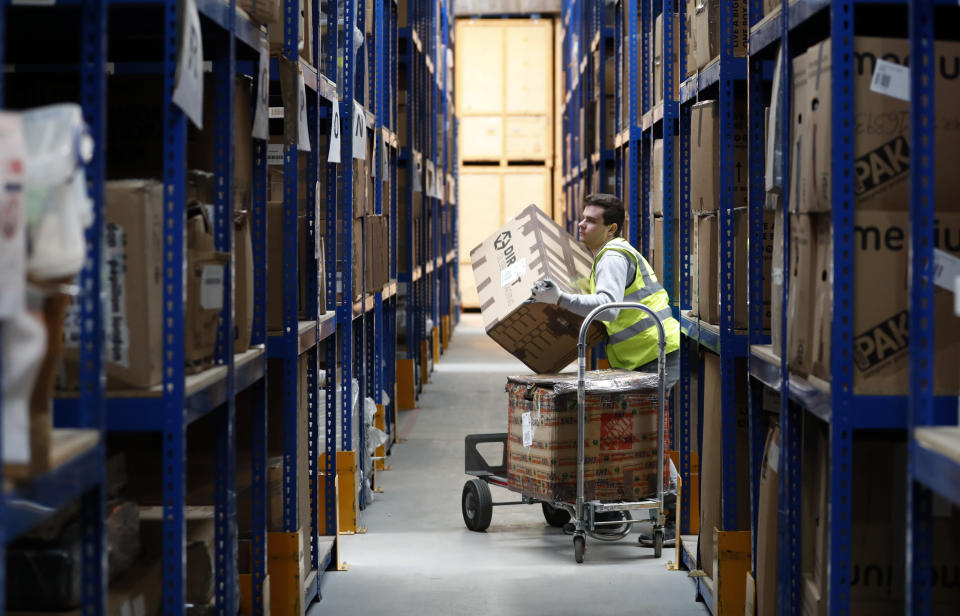Brexit stockpiling and consumer spending boost UK economy

The UK’s economic growth accelerated at the start of the year, according to new data.
GDP grew by 0.5% in the first quarter of 2019, an initial estimate from the Office for National Statistics (ONS) published on Friday showed. The figure was in-line with economists’ consensus forecast for quarter-on-quarter growth and marks an acceleration from the 0.2% GDP growth registered in the final three months of 2018.
Economic growth was boosted by strong consumer spending and manufacturing activity, which likely reflected stockpiling in preparation for Brexit. During the period measured, businesses thought the UK would leave the EU on 29 March and there was a real threat of the UK crashing out in a no-deal Brexit.
Stockpiling boost
Manufacturing activity grew by 2.2% in the quarter and contributed to just under half of total GDP growth in the quarter.
“Some businesses brought activity forward early this year in preparation for leaving the EU, so higher stocks and earlier orders have artificially bumped up the growth numbers,” Tej Parikh, senior economist at the Institute of Directors, said.
Separate manufacturing and industrial production figures released on Friday beat economists’ forecasts. Manufacturing activity grew by 0.9% in March, compared to an estimate of 0.2%, and industrial production increased by 0.7% in March, against an estimate of 0.1%.
“It is difficult to unpick how much of the increase in manufacturing output in Quarter 1 2019 might reflect the increase of domestic output produced by UK manufacturers in response to the stockpiling demands by UK and/or foreign manufacturers,” the ONS said.
Parikh said any stockpiling boost would likely be temporary as “many firms will be keen to run down their Brexit caches, which will drag on economic growth.”
‘Households continued to spend’
First quarter GDP was also boosted by a “a sharp pickup in the output of the wholesale, retail, and motor trades industries, which increased by 1.2% in the first quarter of 2019,” the ONS said.
“This increase broadly reflects a pickup in growth of retail sales, which increased by 1.6% in the first three months of 2019.”
Mike Jakeman, senior economist at PwC, said: “Households continued to spend, with private consumption rising by 0.7% quarter on quarter. But more significant was the return to growth of business investment, which expanded by 0.5% after four consecutive quarters of decline as firms delayed investment decisions owing to Brexit uncertainty.”
Total business investment increased by 0.5% in the quarter, compared to an estimate of -0.6%.
“The return to growth in the first quarter was not because any certainty was provided by politicians,” Jakeman said. “Instead, firms are likely to have spent more on contingency planning and perhaps decided that some investment decisions could be delayed no longer, after a year of sitting on the sidelines.”
‘A flash in the pan’
The ONS cautioned that the recovery in growth and investment was in part down to weak growth in the prior quarter, which flattered the first quarter figures.
“The strength in quarterly growth is in part due to the low December 2018 monthly growth in the base period, which makes the current period look stronger in comparison,” the ONS said. “Having fallen by 0.3% in December 2018, there was offsetting strength in January 2019 as output increased by 0.5%, followed by a further increase of 0.2% in February 2019.”
There are already signs of slowing momentum heading into the second quarter. The ONS said that month-on-month GDP growth in March was actually -0.1%.
“The relatively strong growth figures for Q1 may just be a flash in the pan,” Parikh said. “While the Brexit extension avoided the immediate risk of ‘no deal,’ the economy will remain in a state of limbo until there is a clear path out of this situation.”
The UK economy grew by 1.8% in the first quarter of 2019 when compared to the first quarter of 2018. This was in-line with economists’ forecasts and an acceleration on the 1.4% annual growth recorded in the final three months of 2018.

 Yahoo Finance
Yahoo Finance 